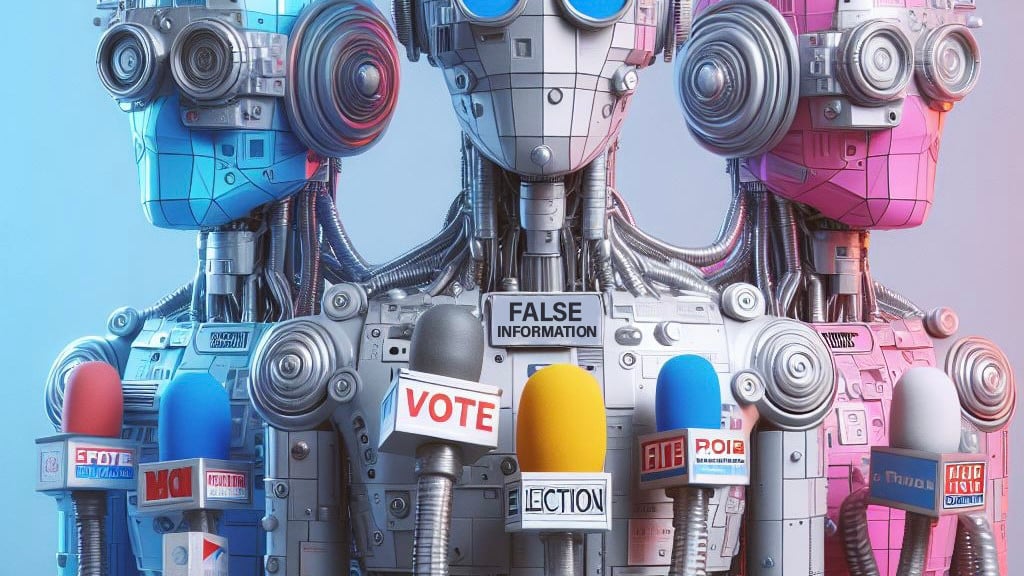AI-Driven Misinformation is a Major Threat for Elections Across Continents: WEF Report


In Brief
The World Economic Forum’s “Global Risks Report 2024” outlines AI-driven misinformation as one of the biggest threats for elections.

There are major concerns over AI’s potential to disrupt election outcomes and is considered the foremost risk in 2024, as outlined in The World Economic Forum’s “Global Risks Report 2024”. The heightened apprehensions regarding the impact of artificial intelligence on electoral processes hold value — in a year marked by a surge in electoral activities, with approximately half of the global adult populace participating in polls.
One of the key concerns raised is the potential impact on the upcoming elections in major economies, including the United States, Britain, Indonesia, India, Mexico and Pakistan.
Additionally, the report identifies AI-driven misinformation and disinformation as the biggest short-term threat to the global economy. The potential consequences are far-reaching, with the report expressing deep concern that politics could be disrupted by the spread of false information, potentially leading to riots, strikes and government crackdowns on dissent.
Released ahead of the annual meeting of political and business elites in Davos, it identifies this insidious threat as the most significant short-term peril to the global economy, with elections in major countries intensifying concerns.
“Disinformation will also be increasingly personalized to its recipients and targeted to specific groups, such as minority communities, as well as disseminated through more opaque messaging platforms such as WhatsApp or WeChat,” the report mentioned.
The report, based on the opinions of 1,400 experts, industry leaders, and policymakers, presents a sobering outlook for the next two years.
Potential Pitfalls of AI-Generated Misinformation
According to the report, the rapid advances in technology, including AI, have given rise to an alarming situation. Generative AI, exemplified by chatbots like ChatGPT, is a particular cause for concern. The authors worry that the proliferation of such technology means that creating sophisticated synthetic content capable of manipulating groups of people is no longer limited to those with specialized skills.
The report places a spotlight on the intersection of AI and misinformation, highlighting the emergence of a powerful tool that threatens to erode democracy and polarize societies globally. The organization warns that misinformation and disinformation are not only the biggest short-term risks but are also intertwined with societal polarization, making them particularly challenging to address.
Further, the report mentions that the difference between AI and human generated content is becoming more difficult to discern, not only for digitally literate individuals, but also for detection mechanisms. Research and development continue at pace, but this area of innovation is radically underfunded in comparison to the underlying technology.
The Davos meetings next week are expected to delve into these concerns, with tech company leaders such as OpenAI CEO Sam Altman, Microsoft CEO Satya Nadella, and Meta’s chief AI scientist, Yann LeCun, in attendance. AI is slated to be a hot topic of discussion, as leaders grapple with the ethical and practical challenges posed by the rapid evolution of technology.
In conclusion, The WEF’s annual risks report emphasizes the need for urgent and comprehensive measures to counter the growing threat.
Disclaimer
In line with the Trust Project guidelines, please note that the information provided on this page is not intended to be and should not be interpreted as legal, tax, investment, financial, or any other form of advice. It is important to only invest what you can afford to lose and to seek independent financial advice if you have any doubts. For further information, we suggest referring to the terms and conditions as well as the help and support pages provided by the issuer or advertiser. MetaversePost is committed to accurate, unbiased reporting, but market conditions are subject to change without notice.About The Author
Kumar is an experienced Tech Journalist with a specialization in the dynamic intersections of AI/ML, marketing technology, and emerging fields such as crypto, blockchain, and NFTs. With over 3 years of experience in the industry, Kumar has established a proven track record in crafting compelling narratives, conducting insightful interviews, and delivering comprehensive insights. Kumar's expertise lies in producing high-impact content, including articles, reports, and research publications for prominent industry platforms. With a unique skill set that combines technical knowledge and storytelling, Kumar excels at communicating complex technological concepts to diverse audiences in a clear and engaging manner.
More articles

Kumar is an experienced Tech Journalist with a specialization in the dynamic intersections of AI/ML, marketing technology, and emerging fields such as crypto, blockchain, and NFTs. With over 3 years of experience in the industry, Kumar has established a proven track record in crafting compelling narratives, conducting insightful interviews, and delivering comprehensive insights. Kumar's expertise lies in producing high-impact content, including articles, reports, and research publications for prominent industry platforms. With a unique skill set that combines technical knowledge and storytelling, Kumar excels at communicating complex technological concepts to diverse audiences in a clear and engaging manner.





















































